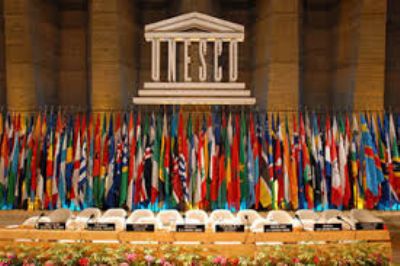"[O]n July 7, 2017, UNESCO was all action when its World Heritage Committee approved a resolution recognizing Hebron's Old City and the Cave of Patriarchs as specifically Palestinian heritage sites... In truth, UNESCO lost its credibility long ago. Its July 2017 vote, however odious, was hardly a shocking development. Back in 1982, UNESCO added the Old City of Jerusalem and its Walls to its endangered list, notwithstanding the fact that the Israeli authorities had long before handed control of the Temple Mount to the Islamic Trust, or Waqf, while simultaneously preventing Jewish religious rites on the premises and abstaining from any archaeological investigations. The only meaningful excavation on the Mount in recent decades, one notes with interest, was carried out pursuant to the construction of the El-Marwani Mosque, which was built atop Solomon's Stables and involved, as Shany Mor has observed, 'a wanton and unrecoverable destruction of archaeological treasures ranging across three millennia of human patrimony. Unlike the imagined archaeological damage fantasists and fanatics accuse Israel of committing, this was never condemned by UNESCO or any other international body.' In 2015, UNESCO was at it again, accusing Israel of conducting 'illegal excavations' in its own sovereign territory, and of damaging the 'visual integrity' of the Old City by constructing a much-needed light rail system which will provide mass transit opportunities to Arab as well as Jewish quarters. The most recent meeting of the World Heritage Committee in Kraków managed to reach a new low, with the aforementioned ahistorical Hebron vote as well as the holding of a moment of silence for Palestinians immediately after a moment of silence for victims of the Holocaust. Israel's envoy to UNESCO, Shama Hacohen, immediately rejected the 'horrifying parallel between Holocaust victims to other victims and Palestinian victims,' but the damage was done.
If one goes back far enough, it becomes apparent that UNESCO's deficiencies were present ab initio. The agency's task, according to its lofty constitution, is to pursue the 'education of humanity for justice and liberty and peace,' for 'it is in the minds of men that the defenses of peace must be constructed,' but the 1948 UNESCO General Conference in Beirut quickly demonstrated the limitations of this kind of universalist program. Lebanon refused to grant entry to Israeli observers, prompting the Czechoslovakian, Hungarian, and Polish delegations to object strenuously to the choice of host, on the grounds that Lebanon constituted an 'aggressor' against Israel in 'violation of UN high policy.'... Amidst the tensions of the Cold War and the litany of Middle Eastern crises, the State Department would lose interest in UNESCO as a vehicle for cultural diplomacy, and the agency would gradually slither into an infamous morass of anti-Israeli and anti-Semitic sentiment...
It has become clear that UNESCO, like the UN Human Rights Council, is so ensorcelled by this insidious ideology that it can no longer be treated as some kind of bureaucratic curate's egg; the rot has spread too far for it to be considered remotely salvageable. At least Ambassador Haley and the current administration seems to understand this, in a distinct and welcome break from the last regime..."
July 13, 2017
UNESCO in Ruins: Anti-Semitism and the Perversion of Cultural Heritage Preservation

Date
July 13, 2017
Title
UNESCO in Ruins: Anti-Semitism and the Perversion of Cultural Heritage Preservation, American Spectator
Author(s)
Matthew Omolesky
Original Source
